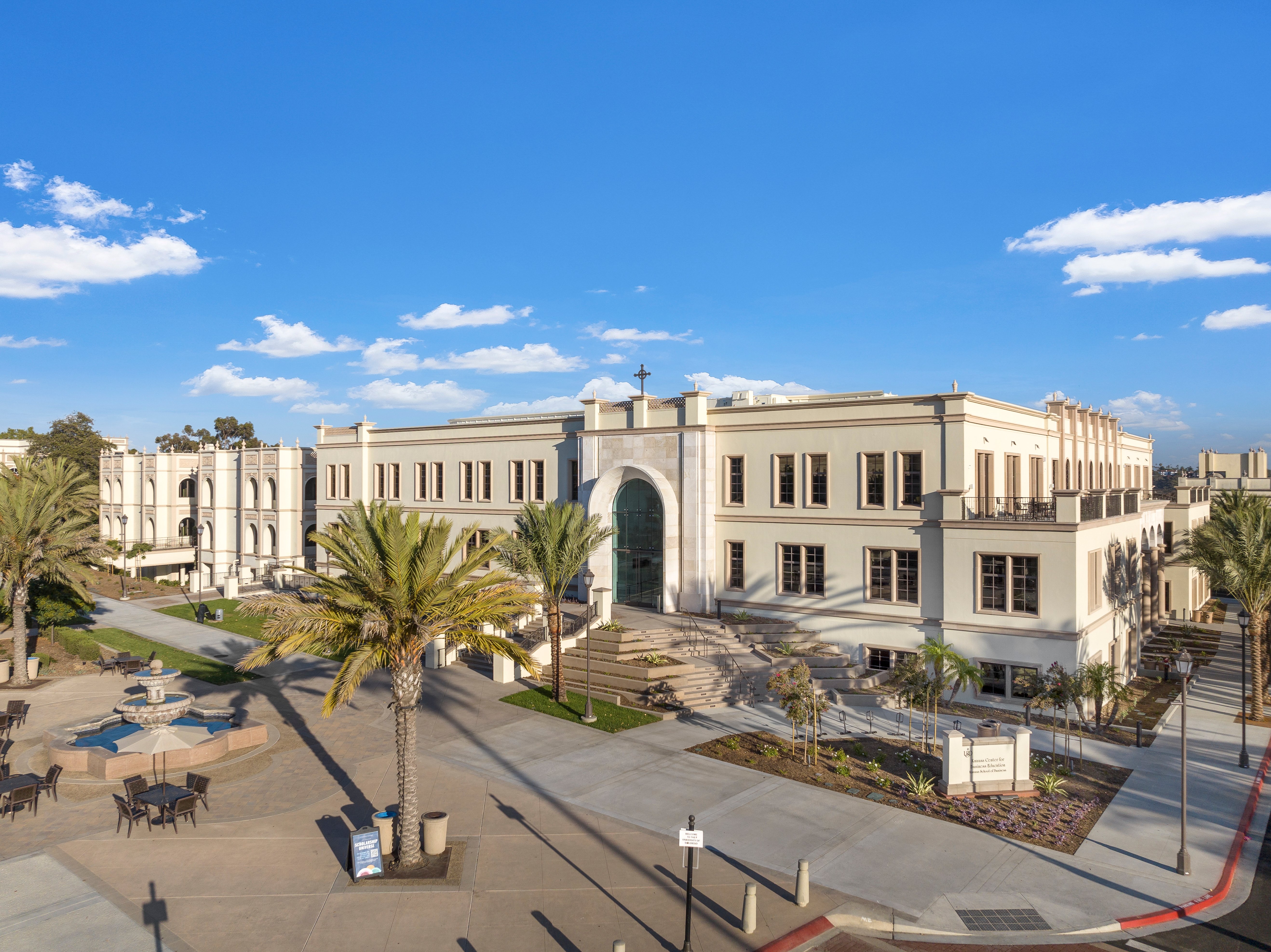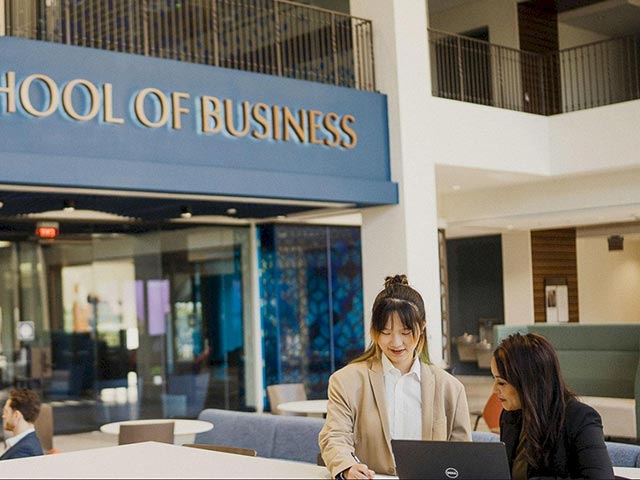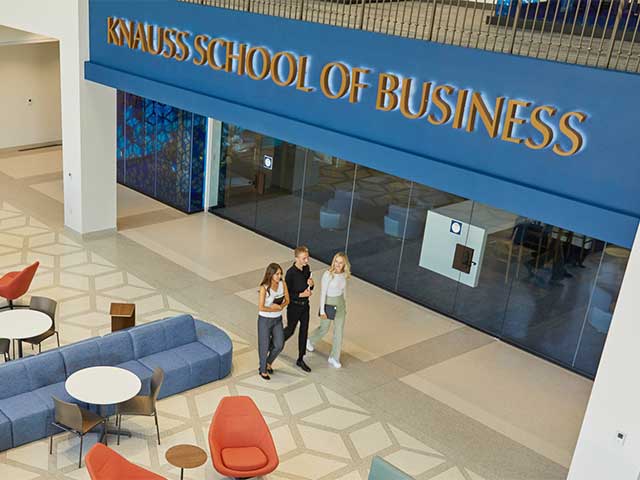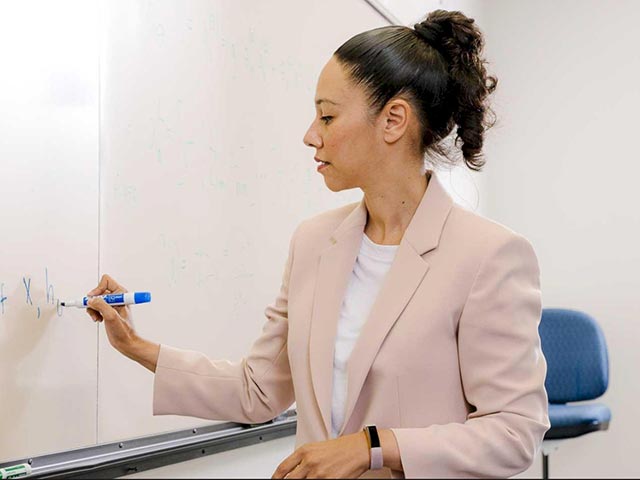7 Factors to Look for in a Good Business School

Higher education can feel oversaturated with business programs. For prospective students, the challenge isn't finding a business school, but selecting a program that effectively prepares them to lead ethically in the business world. Good business schools are pivotal in shaping future business leaders and entrepreneurs.
A business school can make or break your educational experience and the benefits you take away from the program. But what are good business schools really like? Prospective business students should look for the following features at their school:
- High-caliber faculty
- Ideal class sizes
- Strong business partnerships
- Preferred program modality
- AACSB accreditation
- Location and surrounding economy
- Type of campus
Audio produced by Hubspot using AI narration.
What to Look for in a Good Business School
1.) High-Caliber Faculty
Choosing a business school means you’re also choosing that school’s faculty. The professors and instructors at business school set their students up for success in their careers. When you’re researching your business education, take a look at the:
- Longevity and retention of faculty — established faculty have credibility and speak to the school’s relevance and competitiveness.
- Faculty to student ratio — smaller class sizes allow students to have more facetime with faculty and more personalized instruction.
- Research interests and/or areas of expertise — do these align with your interests and what you hope to learn? Is the school publishing research regularly?
- Real-world experience of the faculty — especially when it comes to business (and networking), you want faculty who have worked or are currently working in the fields you want to break into. Schools that employ adjunct faculty bring in new industry experience to teach on relevant topics.
The Knauss School of Business at USD has world-renowned business faculty that extend their expertise beyond the classroom. They continue to impact the world of business by providing consultation services to local and international businesses, presenting at industry events and offering mentorship to students.
2.) Ideal Class Sizes
Class size in business schools can range from small to large, so it's worth considering what will help you learn best. Larger class sizes mean more lecture-learning instead of whole-class discussions. While more classmates isn't necessarily bad, it can be harder to ask a question or contribute to discussions.
A smaller class size usually means more participation and engagement from each student. It can also mean more one-on-one attention from faculty during office hours. This can make all the difference when you are struggling with a new finance or accounting concept.
Also, consider that business schools are training grounds for your professional development. Have you ever seen a professional environment that looks like a lecture hall? With small class sizes, the discussions, teamwork and projects can better simulate the real world. Practicing your soft skills in this environment is an extremely valuable part of business school and can help prepare you for career success.
At the Knauss School, most of our classes are kept small with around 35 students. Whether the professor is leading discussion around a case study or facilitating breakout groups, it's easy for all students to get involved or ask a question. Small class sizes ensure that each student can actively participate and get the most out of their business education.
3.) Strong Business Partnerships
Business partnerships should be a core part of good business schools. Offering regular industry partners has myriad benefits to students, including expanded networking opportunities through special panels, speakers, workshops, career services, company visits and more, as well as real-world business involvement. Partnerships can provide students with industry experience they need to stand out in the job market as they work with real companies on real-world business projects.
At the Knauss School, students have unique opportunities to engage in business partnerships through connections with our school’s Centers of Excellence. One of those is with the Brink Small Business Development Center, the #1 start-up incubator in San Diego, housed within the Knauss School building. By serving innovative businesses, students can join as junior consultants and work directly with startups to gain hands-on experience and practical skills.
Additionally, the Knauss School offers international study abroad opportunities for students to complete an international experience, ensuring a well-rounded education that incorporates global perspectives and real-world business opportunities. These partnership opportunities provide students with the chance to apply classroom knowledge in real business settings and expand their skills in diverse learning environments through a consulting project, company visits, mentorship programs and industry mixers.
4.) Preferred Program Modality
Working professionals often need to pursue a graduate business degree on a schedule that accommodates their busy lives. Prospective students exploring business programs will encounter a variety of modalities tailored to accommodate diverse learning preferences and schedules.
- Full-time programs: Offer a traditional educational experience, allowing students to focus on their studies full-time and complete their degree in a structured timeline.
- Part-time programs: Provide flexibility for working professionals or individuals with other commitments, allowing them to pursue their degree at a more gradual pace.
- Flex or hybrid programs: Blend in-person and online coursework, accommodating students who require more flexibility and balance between the two formats.
- Executive programs: Designed for seasoned professionals seeking advanced education, often with a focus on leadership development and practical application of skills.
- Accelerated programs: Expedite your degree completion, typically through intensive coursework and streamlined schedules.
Each modality presents unique benefits, whether it be flexibility, convenience, accelerated progress, or specialized focus. The important thing is to focus on finding a school that offers your preferred program modality.
The Knauss School offers a diverse range of program options beyond its robust Full-time MBA. The Part-time MBA program has evening classes for those with daytime commitments, while the Flex MBA is a hybrid program that meets in person once a month. Students can choose the pathway that best aligns with their goals, lifestyle and learning preferences.
5.) AACSB Accreditation
One simple way to determine the caliber of your business education is the accreditation at your institution. Consider if schools are AACSB-accredited in your search. As the highest possible level of accreditation, achieved by only 6 percent of business schools worldwide, AACSB accreditation automatically sets a high standard for any business program.
The Knauss School has earned its reaccreditation by AACSB, placing the school in the forefront of business education. Its dedicated faculty, high academic standard and commitment to social impact continues to set it apart from other business schools globally.
6.) Location and Surrounding Economy
Good business schools are often located within reach of industry hubs, internships and job opportunities. Practical business education involves in-person opportunities for every student.
The Knauss School of Business is located in San Diego, America's 8th largest city, and offers students incredible opportunities in a vibrant economy. San Diego might be known for its amazing beaches and climate, but it is home to major sectors such as technology, biotech, defense and tourism. Small businesses also thrive here, and the region is fast becoming a hub for innovation and entrepreneurship. Known as an international gateway city, San Diego boasts strong ties to Mexico, South America and Asian markets.
With proximity to leading tech companies, military institutions and renowned research centers, Knauss School students have access to valuable networking connections, internships and potential career opportunities in the city's dynamic business landscape.
7.) Your Desired Type of Campus
The campus setting of any potential school plays a crucial role in shaping your overall experience. Urban campuses are known for their vibrant atmosphere and ability to integrate a diverse student population and ample opportunities for networking and cultural experiences. Suburban campuses typically have a more "traditional" layout, just minutes away from accessible city perks without the hustle and bustle. Rural campuses offer a secluded ambiance with a focused setting for academic pursuits. No campus type is better than another, but it's important to choose the one that best aligns with your personal preferences and goals.
The choice between research universities and liberal arts universities can significantly impact your academic environment as well. Research universities have larger, sprawling campuses, accommodating a diverse student body and offering a wide range of academic programs that focus on your specific discipline of study. Liberal arts universities offer a well-rounded education that emphasizes critical thinking, creativity, diversity of thought and interdisciplinary learning. They usually feature smaller, more intimate campuses that foster a strong sense of community.
On the The Princeton Review's list of best campuses in the U.S., the University of San Diego ranks #1 for the most beautiful campus. The Knauss School of Business at USD boasts new state-of-the-art academic facilities to supplement professional preparation in all areas of business. By carefully considering the campus environment when choosing a business program, you can find the setting that aligns with your academic goals and personal values.
Explore One of the Best Business Schools in California
The Knauss School of Business at the University of San Diego believes in a better way to business. The Knauss School offers rigorous academics, an ideal location, experiential learning and values-driven free enterprise for every business student — all the factors a good business school should offer. By beginning your business education at Knauss School, you join a network of real-world professionals, experienced faculty, and close peer relationships.
But the Knauss School is not just a good business school in California — it’s one of the best. Here are some of our rankings:
- #2 Best Business School in California for Undergraduates
- #5 for Undergraduate Study Abroad Participation
- #4 Greatest Resources for Women
- #7 Most Family-Friendly
- #8 Most Diverse MBA in the Nation
- #8 Best Green MBA
Choosing the right business school can feel overwhelming, but the outcomes at the Knauss School speak for themselves. Discover our business programs and take the first step toward making a positive impact in the business world.
Request More Information about the Knauss MBA
Unlock Your Potential: Download the MBA Career Guide









